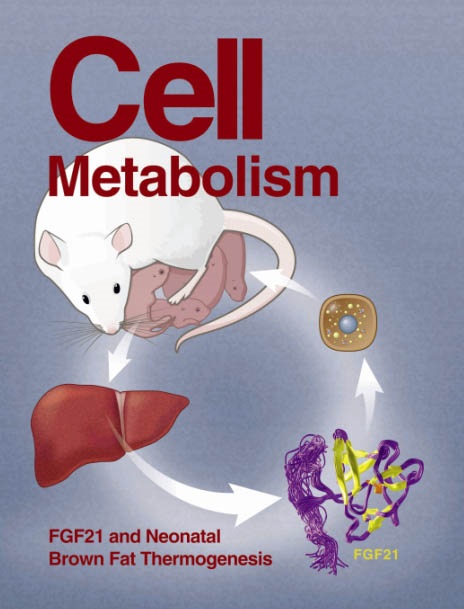FGF21通过独立于生长抑制的代谢益处促进饮食引起的肥胖的寿命
IF 30.9
1区 生物学
Q1 CELL BIOLOGY
引用次数: 0
摘要
大约35%的65岁以上的美国成年人肥胖,这突出了针对年龄相关代谢问题的治疗需求。成纤维细胞生长因子21 (FGF21)是一种主要由肝脏产生的激素,可以促进新陈代谢,延长寿命。为了探索其在没有发育混杂因素的情况下的作用,我们从成年期开始培养了脂肪细胞特异性FGF21过表达的小鼠。当喂食高脂肪食物时,这些小鼠活了3.3年,抵抗体重增加,改善胰岛素敏感性,并显示出肝脏脂肪变性减少。衰老的转基因小鼠也显示出较低水平的炎症免疫细胞和内脏脂肪组织中的脂毒神经酰胺,即使在缺乏脂联素(一种已知的调节神经酰胺分解的激素)的情况下也会出现这种益处。这些结果表明,脂肪组织是FGF21有益作用的中心部位,并指出其在治疗代谢综合征和年龄相关疾病方面的潜力,通过促进饮食应激下更健康的代谢谱,延长健康寿命和寿命。本文章由计算机程序翻译,如有差异,请以英文原文为准。

FGF21 promotes longevity in diet-induced obesity through metabolic benefits independent of growth suppression
Approximately 35% of US adults over 65 are obese, highlighting the need for therapies targeting age-related metabolic issues. Fibroblast growth factor 21 (FGF21), a hormone mainly produced by the liver, improves metabolism and extends lifespan. To explore its effects without developmental confounders, we generated mice with adipocyte-specific FGF21 overexpression beginning in adulthood. When fed a high-fat diet, these mice lived up to 3.3 years, resisted weight gain, improved insulin sensitivity, and showed reduced liver steatosis. Aged transgenic mice also displayed lower levels of inflammatory immune cells and lipotoxic ceramides in visceral adipose tissue, benefits that occurred even in the absence of adiponectin, a hormone known to regulate ceramide breakdown. These results suggest that fat tissue is a central site for FGF21’s beneficial effects and point to its potential for treating metabolic syndrome and age-related diseases by promoting a healthier metabolic profile under dietary stress and extending healthspan and lifespan.
求助全文
通过发布文献求助,成功后即可免费获取论文全文。
去求助
来源期刊

Cell metabolism
生物-内分泌学与代谢
CiteScore
48.60
自引率
1.40%
发文量
173
审稿时长
2.5 months
期刊介绍:
Cell Metabolism is a top research journal established in 2005 that focuses on publishing original and impactful papers in the field of metabolic research.It covers a wide range of topics including diabetes, obesity, cardiovascular biology, aging and stress responses, circadian biology, and many others.
Cell Metabolism aims to contribute to the advancement of metabolic research by providing a platform for the publication and dissemination of high-quality research and thought-provoking articles.
 求助内容:
求助内容: 应助结果提醒方式:
应助结果提醒方式:


